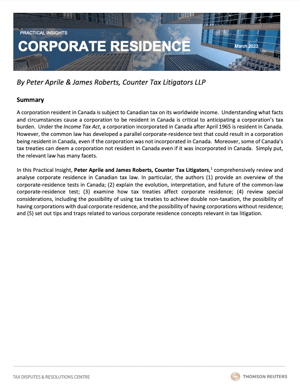
*Thompson Reuters considers the authors “leading tax experts and litigators”. This content first appeared in TR’s, Practical Insights in May 2020.*
Background
 The common-law corporate-residence test provides that a corporation is resident in the place of the corporation’s central management and control. This section examines the development of the central management and control test, breaks down precisely what central management and control is, reviews the relevant jurisprudence, and contemplates the future of the central management and control test.
The common-law corporate-residence test provides that a corporation is resident in the place of the corporation’s central management and control. This section examines the development of the central management and control test, breaks down precisely what central management and control is, reviews the relevant jurisprudence, and contemplates the future of the central management and control test.
Central Management and Control Explained
Central management and control refer to the strategic management decisions that drive the corporation’s business. In the industry, and even in the jurisprudence, central management and control is often referred to as the corporation’s “mind and management”. However, mind and management and central management and control are synonyms for the same test: the common-law corporate-residence test. It is possible that many professionals and judges use the term “mind and management” as a way to prevent importing shareholder control into the analysis. In any event, central management and control and mind and management both refer to the corporation’s strategic management decisions.
To understand what constitutes strategic management decisions, it is necessary to set out the different levels of corporate decisions. In 1982, the United Kingdom commissioned a working party to examine, among other things, the different levels of corporate decisions.1 The working party identified the following three categories of corporate management and decision-making: strategic management, actual or effective management, and junior management.
The Three Categories of Corporate Management and Decision Making
Strategic Management
Strategic management refers to the management exercised by the corporation’s director or board of directors. Specifically, strategic management includes decisions related to:
- acquiring or selling substantial assets,
- significant capital expenditures,
- approving or rejecting budgets,
- major operational decisions,
- reorganizing subsidiary corporations, and
- approving or executing material.
Although directors have the legal authority to make strategic management decisions, they do not always exercise this authority and, therefore, a proper analysis will also examine who — regardless of title — makes the strategic management decisions. Central management and control refers to strategic management and, therefore, the place where the strategic management decisions are made determines the corporation’s residence.
Actual or Effective Management
Actual or effective management refers to the management exercised by the corporation’s executives. The task of the corporation’s executives — e.g., chief executive officer, chief financial officer, chief operating officer, president, etc. — is to run the corporation according to the strategic management. In other words, the corporation’s executives make decisions that they believe will result in the corporation implementing the corporation’s strategic management decisions and achieving the corporation’s strategic goals. Actual or effective management does not constitute strategic management and, therefore, is not relevant in the corporate-residence analysis.
Junior Management
Junior management refers to the management of the corporation’s day-to-day operations. The day-to-day operations will vary depending on the corporation’s business. However, generally speaking, the individuals managing the day-to-day operations are individuals that report to the corporation’s executives. Junior management is not relevant in the corporate-residence analysis.
A Note about Shareholder Management
Another level of decision making that is not relevant to the corporate-residence analysis is the shareholder level. In particular, the shareholders’ right to elect directors and to amend the corporation’s constating documents is not relevant in the corporate-residence analysis.
Questions to Answer to Determine Corporate Residence
Based on the foregoing, a proper analysis of corporate residence necessarily involves answering the following questions:
- What are the corporation’s strategic management decisions?
- Who are the individuals that make the corporation’s strategic management decisions?
- Where are the individuals when they make the corporation’s strategic management decisions?
Determining a Corporation’s Strategic Management Decisions
The first step when applying the common-law test to determine a corporation’s residence is to identify what constitutes a strategic management decision for the particular corporation. The question must look to the specific corporation under review because it is not possible to determine what constitutes top-level decision related to the corporation’s business without examining the specific corporation’s business and purpose.
_ElectricBlueGradient-Flat.jpg?width=812&height=360&name=CounterBlogPattern(2)_ElectricBlueGradient-Flat.jpg)
Determining Who Makes a Corporation’s Strategic Management Decisions
After determining the corporation’s strategic management decisions or the type of decisions that would be strategic management decisions based on the corporation’s business or purpose, the second step when applying the common-law test is to determine who makes the strategic management decisions.
Determining Where Strategic Management Decisions are Made
After determining what are, and who makes a corporation’s strategic management decisions, the third step when applying the common-law test is to determine where the strategic management decisions are made. This step may appear straightforward. However, there may be circumstances in which it is not easy to determine where a decision is made.
First, although the decision makers’ personal residence is irrelevant when determining corporate residence, some people mistakenly assume that personal residence is relevant and that individuals make decisions in their country of residence.2 If a corporation’s directors are resident in Canada, some people assume that directors are making the strategic management decisions in Canada, unless there is evidence to support that the individuals hold directors’ meetings outside of Canada. It is important to examine where the individual decision makers actually make the decisions, not simply where the individual decision makers normally reside.
Second, there may be situations in which not all decision makers are in the same place when they make a decision. For example, a board of directors might meet with some directors in Canada and some directors outside of Canada attending the meeting by telephone, or video conference. In this situation, it is arguable that the decisions are made in the country where the majority of the directors are located during the meeting. However, if there are three directors and each is in a different country at the time they make a strategic management decision, where is that decision considered to have been made? The answer is unclear. It is arguable that the decisions are made in the country that initiates the conference call or video conference. In these cases, it is likely that appropriate processes and meeting documentation will play an important role in determining where the meeting, and the decisions, took place.
Citations
1 Report of the Working Party on Company Residence, Tax Havens, and Upstream Loan, IFS Report Series No. 3 (London: The Institute for Fiscal Studies, 1982) [IFS Company Residence Report].
2 Albert Baker and Ian Gamble, “Corporate Residence”, Canadian Tax Foundation (2011) at 17.

.jpg?width=120&name=Counter%20Tax%20Litigators%20Logo%20Stacked%20(MidnightBlue%20on%20White).jpg)
_ElectricBlueGradient-Flat.jpg?width=1921&height=851&name=CounterBlogPattern(2)_ElectricBlueGradient-Flat.jpg)




.png?width=400&height=400&name=CT-How_Can_We_Help-22_july_NewGraphic_b(small).png)